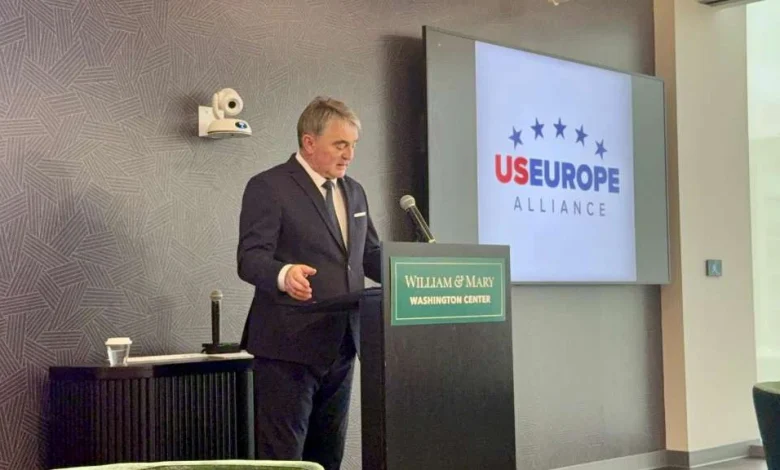Komsic In Washington: On The Political Level, The Path Of BiH Is Firmly Grounded Towards The EU And NATO

The Chairman of the Presidency of Bosnia and Herzegovina (BiH), Zeljko Komsic, participated as the keynote speaker at the International Conference “30 Years After the Dayton Peace Agreement”, held in Washington, at the invitation of the Vice President of the United States (U.S.) – Europe Alliance organization from Washington, Reuf Bajrovic.
The conference was held at the William & Mary Washington Center and gathered experts, diplomats, representatives of academia, and political leaders who discussed the legacy of the Dayton Peace Agreement, the current political situation in BiH, and the prospects of future development and security in the region.
We bring his speech in full:
“Distinguished excellencies, ladies and gentlemen,
Thirty years ago, with the signing of the General Framework Agreement in BiH, peace was established, and a three-and-a-half-year-long bloody war ended, which was accompanied by the most severe forms of war crimes and ethnic violence, including genocide.
Dayton made peace possible. Although that peace was not always perfect or complete, it became a fact in the everyday lives of BiH citizens, and that fact has no alternative.
The Dayton Peace Agreement also confirmed the state-legal continuity of BiH, which is clearly visible from the first article of the Constitution of BiH.
Although fully aware that we fought by ourselves for our own state and its survival, and with great sacrifices, we remain deeply grateful, above all, to the U.S. – but also to other friendly states – for their political and every other kind of assistance.
Without them, the survival of BiH would be under a big question mark.
With the establishment of full peace, BiH received the opportunity to build its independence and sovereignty through political, economic, infrastructural, and overall social recovery.
Because of that, in the following points, I will briefly outline where our successes stand and what we have achieved in the past thirty years.
According to UNHCR data, more than 1.000.000 former refugees and displaced persons returned to BiH after the war.
We established a range of institutions that protect the sovereignty and political integrity of BiH through institutional memory. That continuity of statehood enabled the establishment of various forms of business and social cooperation between peoples and citizens, and the free movement of goods and capital unified economic integration among communities.
BiH records, with a few years of exception, a continuous thirty-year economic growth between 2%-5%. Our exports continue to grow in European and global markets.
On the political level, the path of BiH is firmly grounded towards the European Union (EU) and NATO.
That path was difficult and full of obstacles.
In March 2024, by the decision of the European Council, we opened the EU accession negotiations, seventeen years after signing the Stabilisation and Association Agreement.
Since 2008, we have been part of NATO’s Membership Action Plan, and by adopting all annual reform programs, we continue to build the defence and security capacities of BiH.
In strengthening interoperability with NATO standards and processes, we are additionally supported by the defence capacity-building package adopted at the NATO summit in Madrid.
Being a witness to the war, but also to all post-war processes, it is not unfounded for me to say that the Dayton Agreement is the most successful peace agreement and creation of U.S. diplomacy in the last century.
However, although the state has achieved impressive progress in the past thirty years, the post-Dayton structure has not made the necessary step forward in terms of improving human rights, political equality for all citizens, and establishing a more just political system. That remains the biggest deficiency of the constitutional framework of the BiH society.
For it to continue bearing the title of the most successful peace agreement, it is natural that such an agreement be upgraded along the way. That is not, as the opponents of BiH statehood claim, the creation of a new nation. It is the strengthening of world peace.
We are witnessing that the recent years have been marked by the greatest crises of security and political instability in BiH.
There is no one in the country or in Europe who does not recognize that political aggression still continues and is being realized through the politics of separatist forces in BiH, which are actively supported by Belgrade and Zagreb. This is the legacy of the defeated military aggressions of neighboring states from the previous war.
These attacks on the BiH state have become everyday precisely because the current constitutional framework rewards, instead of discouraging, the logic of ethno-nationalist politics – substituting democratic pluralism and civic equality with territorial control and ethnic exclusivity.
Numerous judgments of the European Court of Human Rights (ECHR) testify to this, pointing to the removal of ethnic discrimination and demanding the introduction of civic standards into the political system of BiH.
In BiH, there exists a critical mass capable of implementing such reforms, but it needs real support from international democratic forces. Such an undertaking strengthens world peace in the new geopolitical reality where the dominance of force over international law is achieved at the expense of small states and unfinished peace and democratic processes, among which is BiH.
Recently, I spoke about the embargo on democracy in BiH.
If the implementation of that embargo continues, the separatist policies based on ethno-national exclusivity, which produce constant instabilities, will prevail. They are the source of chronic dysfunction that prevents the development of real democracy, because our constitution violates almost all European values, democratic principles, and human rights standards on the Old Continent.
However, the U.S. wisdom in concluding the General Framework Agreement left a natural corrective for such shortcomings. Precisely in the Dayton Agreement, that is, the Constitution of BiH, it is prescribed that the European Convention on Human Rights has primacy even over the Constitution of BiH.
Therefore, the implementation of the judgments of the ECHR and the introduction of the civic model into the political system of BiH are not contrary to the Dayton Agreement and the Constitution of BiH.
On the contrary, these obligations arise from our Constitution, as well as from the natural upgrading and modernization of the constitutional and social framework in BiH.
In the end, looking from our BiH perspective at global developments, I want to emphasize that the Dayton Agreement, despite all its shortcomings, is a pillar that needs to be further developed. Our BiH peace is already longer-lasting than the Versailles one, and perhaps even more stable than the Yalta one, despite the constant winds of new wars.
BiH lives its peace in a particular way that provides hope that it will last, no matter how often it seems that it is fundamentally undermined. The people of this country and the country itself cannot be attacked without serious consequences, and that is what provides some kind of guarantee that peace will endure.
Therefore, today, while especially thanking the U.S. soldiers who guarded our peace long after the war, I also believe in the BiH idea that made it possible – the idea of freedom, equality, and justice. BiH exists on those values, because they are not only BiH, but also universal values.
They oblige us to never again allow those who once tried to destroy it to decide about our fate.




